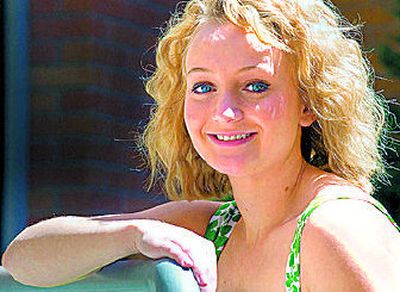2007 Rogers graduates are undeniably first-class

Rogers High School teacher Karrie Docterman keeps track of the students attending four-year colleges or universities by hanging their photos in the hallway outside her classroom.
In past years, Docterman would only have a handful of photos on display. But this year the wall is full of faces.
There are more graduating seniors going on to college than ever before, Rogers officials say.
“We’ve never had a class like this,” said Nancy Pemberton, the school’s career specialist. “This is a very special group of kids. They’ve set the bar very high.”
According to school officials, seniors from the northeast Spokane school have been accepted to some of the most prestigious colleges and universities in the nation including Stanford, New York University, the United States Air Force Academy, Columbia University and Harvard. Dozens more are going to state universities and two-year community colleges.
It’s a testament to the changing times at Rogers, a school rife with poverty that has often been considered the underdog among area high schools. About 70 percent of the students at Rogers qualify for free and reduced-price meals.
“We definitely see our kids breaking out of the cycle,” Docterman said. “I’ve seen more involvement than ever before.”
Rogers Principal Carole Meyer said she followed the lead of North Central High School Principal Steven Gering, who began changing the culture at his north Spokane school several years ago with a strategy called academic press.
It’s the idea that peer pressure is expected when it comes to getting good grades and setting college goals.
“Kids are more likely to go to college if they are surrounded by peers who are talking about it,” Gering said.
It also means providing more rigorous options such as Advanced Placement courses so that students have what they need for acceptance to a four-year college or university.
Students are encouraged to take advanced math classes, and more rigorous academic courses instead of the easy-to-pass electives that often fill students’ schedules after graduation requirements are met.
Gering said the school no longer uses the word “elective.” Instead educators tell students the options are courses like math, world language or science.
Three years ago, only 37 percent of North Central students were graduating ready to apply to a four-year college, Gering said. Now, about 55 percent have the academic skills needed to go on to a four-year program.
This year, 325 students took at least one AP exam, compared with 83 in 2001-2002.
At Rogers, the recent college-going push is even more evident. Students took 265 Advanced Placement exams this year, up from 59 exams two years ago. By comparison, there were 472 exams given to students at Lewis and Clark High School two years ago.
In addition, every junior at Rogers took the pre-SAT in preparation for taking the college-entrance exam senior year.
“We’re not worried about the test scores, it’s more about the experience so they will want to do it and see the benefit of it,” Docterman said. “We are trying to get kids to understand that they can move beyond the gates of Hillyard.”
Rogers senior and valedictorian Matthew Rivera said he and his peers pushed each other to reach higher.
“There is a core group of us that all had the same classes, and we fed off each other,” said Rivera, who is one of 2,400 students nationwide accepted to Stanford out of more than 23,000 applicants.
“There is just this stigma behind Rogers,” said senior Alicia Wheeler. “But I don’t think it comes from the outside community, it comes from our own building.”
So many kids think they can’t do it, when she and other seniors are proof that they can, Wheeler said.
“When I was a freshman, there was a girl who got into Yale, and that was a huge deal,” Wheeler said. Now it’s expected that students will achieve higher, she said.
Wheeler, who will be the first in her family to go to college, was accepted to New York University. But because the university could not give her enough financial aid for the $48,000-a-year tuition — her family contribution each year would have been $35,000 a year — she won’t be able to attend.
“It’s a big personal disappointment for me,” Wheeler said. “I’ve worked so hard and to not be able to go because of money is like a slap in the face.”
But Wheeler isn’t going to let it bring her down. She’ll attend the University of Washington, instead.
“I know I did everything I was supposed to do and more,” Wheeler said. “I’m proud of that.”